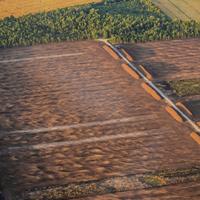Energy from peat – level 2
||торф|
||decomposed plant material|
||Torf|
||토탄|
|来自|泥炭|
||Energía de turba|
||торф|рівень
||energie z rašeliny|
||torf|
Energie aus Torf - Stufe 2
Energía de la turba - nivel 2
L'énergie de la tourbe - niveau 2
Energia dalla torba - livello 2
泥炭からのエネルギー–レベル2
이탄에서 얻는 에너지 - 레벨 2
Energie uit turf - niveau 2
Energia z torfu - poziom 2
Energia da turfa - nível 2
Энергия из торфа - уровень 2
Turbadan elde edilen enerji - seviye 2
Енергія з торфу - рівень 2
来自泥炭的能量——2 级
來自泥炭的能量——2 級
Scientists in Estonia found a new way to make sodium-ion batteries.
|||found||||||||
|||||||||||sodyum iyon pilleri
||Estland|||||||Natrium|ion|
||에스토니아|||||||나트륨|이온|
||爱沙尼亚|||||||钠|离子|
||Estonia|encontraron|||manera|||sodio|ión de sodio|baterías
||Естонії|||||||натрій|іон|батареї
||Estonia|||||||sód|jon|baterie
Los científicos en Estonia encontraron una nueva forma de fabricar baterías de iones de sodio.
エストニアの科学者たちは、ナトリウムイオン電池を作る新しい方法を発見しました。
Cientistas da Estónia descobriram uma nova forma de fabricar baterias de iões de sódio.
They used peat, which was cheaper then some metals in batteries, like lithium or cobalt.
|||||дешевле|||||||||
||peat|||cheaper||||||||or|
||||||||||||||kobalt
||Torf||||||||||Lithium||Kobalt
||토탄|||더 저렴한|||금속||배터리||리튬||코발트
||泥炭|||||||||像|锂||钴
|||||tańszy|||metale||||lit||kobalt
||||||||метали||||літій||кобальт
||turba|||más barato|||metales||baterías||litio||cobalto
Utilizaron turba, que era más barata que algunos metales en las baterías, como el litio o el cobalto.
彼らは泥炭を使用しましたが、これはリチウムやコバルトなどの電池の一部の金属よりも安価でした。
Currently, people use lithium-ion batteries most often, but the problem with these batteries is that they are more expensive and harmful to the environment.
|||||||||||||||||||дороже||вредны|||
at present||||||||||||these|||||||expensive||harmful|||environment
|||||||||||||||||||||zararlı|||
derzeit|||Lithium|||am häufigsten|||||||||||||||schädlich|||Umwelt
현재||||||가장|자주||||||||||더||||해로운|||환경
|||||||||||||||||||||szkodliwe dla środowiska|||
||||||||||||||||||||||||навколишнє середовище
|||||||||||||||||||dražší||škodlivé pro životní prostředí|||
Actualmente|||litio|ión de litio|baterías de iones de litio||||||||baterías (2)||||||||perjudiciales|||medio ambiente
Currently, people use lithium-ion batteries most often, but the problem with these batteries is that they are more expensive and harmful to the environment.
Actualmente, la gente utiliza más a menudo baterías de iones de litio, pero el problema con estas baterías es que son más caras y dañinas para el medio ambiente.
現在、人々はリチウムイオン電池を最も頻繁に使用していますが、これらの電池の問題は、それらがより高価で環境に有害であるということです。
The scientists heat the peat to a high temperature for two to three hours.
|scientists|heat||peat|to||high|temperature|||||
|Wissenschaftler|erhitzen|||||||||||
||가열하다||토탄|||||||||
||||泥炭|||||||至||
||calientan||||||temperatura elevada||dos|||horas
||||||||температуру|||||
||zahřívají||rašelina|||||||||
||podgrzewają|||||||||||
Los científicos calientan el turba a una temperatura alta durante dos o tres horas.
科学者たちは泥炭を2〜3時間高温に加熱します。
Then they get a carbon powder which they use for the batteries.
then||get||carbon|||||||
|||||karbon tozu||||||
|||||Pulver||||||
||||탄소|||||||
||||碳一|碳粉||||||
||||węgiel|proszek||||||
||||carbón|||||||baterías
Luego obtienen un polvo de carbono que utilizan para las baterías.
それから彼らはバッテリーに使用するカーボンパウダーを手に入れます。
The technology is new, and nobody really knows yet how good it will be.
||||||||ještě|||||
|Technologie||||||||||||
|기술||||아무도||||||||
|La tecnología||||||sabe|aún|||||
||||||truly|knows|yet||||will|
La tecnología es nueva y todavía nadie sabe realmente qué tan buena será.
技術は新しく、それがどれほど優れているかはまだ誰にもわかりません。
Still, the world is looking for technologies that are better for the environment, and with electric cars, car makers will need more and more batteries.
still||||||||||||environment||||||makers|will|need|more|||
||||||||||||||||||otomobil üreticileri||||||
||||||Technologien|||||||||||Auto|Autohersteller||||||
||||찾고 있다||기술||||||환경||||||||||||
Wciąż||||||technologie|||||||||elektrycznych|||producenci samochodów||||||
Přesto||||||||||||||||||||||||
||||||tecnologías|||||||||eléctricos|||fabricantes de automóviles||||||baterías
Sin embargo, el mundo está buscando tecnologías que sean mejores para el medio ambiente, y con los coches eléctricos, los fabricantes de automóviles necesitarán cada vez más baterías.
それでも、世界は環境により良い技術を求めており、電気自動車では、自動車メーカーはますます多くのバッテリーを必要とするでしょう。
This technology could help solve the problem with batteries in the future.
||||lösen|||||||
||may||solve|||||||
||||해결하다|||||||
||||resolver||||baterías|||
Esta tecnología podría ayudar a resolver el problema con las baterías en el futuro.
この技術は、将来的にバッテリーの問題を解決するのに役立つ可能性があります。
Difficult words: sodium-ion battery (a type of battery which uses a metal called sodium, and people cannot charge it as many times as the lithium-ion battery), peat (a dark brown substance from dead plants, vegetables and so on), lithium-ion battery (the most usual battery in electronic things, which people can charge many times).
||||||||||||||||||charge||||||||||peat||dark|brown|||dead|plants|||||||||most|usual||||||||||
||||||||||||||||||||||||||||||||물질||죽은|식물||||||||||||||||||||
||||||||||verwendet|||||||||||||||||||||||||||||||||||||||||||||
||||pil|||||||||||||||||||||||||||||||||||||||||||||||||||
||钠|离子|电池||||电池||||||钠|||||||||||锂|||||||||||||||锂|||||||||||||||
||sodio||Batería de sodio||tipo de||||||metal||sodio||||cargar||||||||||Turba.||||Sustancia||muertas|plantas, vegetales||||||||||habitual||||||||||
||ナトリウム|イオン|||||||||||||||||||||||||泥炭|||||||||||||||||||||||||||
||||bateria||||||||metal||||||ładować||||||||||torf|||||||||||||||||||||||||||
Schwierige Wörter: Natrium-Ionen-Batterie (eine Art von Batterie, die ein Metall namens Natrium verwendet und die Menschen nicht so oft aufladen können wie die Lithium-Ionen-Batterie), Torf (ein dunkelbraune Substanz aus toten Pflanzen, Gemüse usw.), Lithium-Ionen-Batterie (die gebräuchlichste Batterie in elektronischen Geräten, die die Menschen viele Male aufladen können).
Palabras difíciles: batería de iones de sodio (un tipo de batería que utiliza un metal llamado sodio, y las personas no pueden cargarla tantas veces como la batería de iones de litio), turba (una sustancia marrón oscura de plantas muertas, vegetales, etc.), batería de iones de litio (la batería más común en cosas electrónicas, que las personas pueden cargar muchas veces).
難しい言葉:ナトリウムイオン電池(ナトリウムと呼ばれる金属を使用する電池の一種で、リチウムイオン電池のように充電することはできません)、ピート(枯れた植物や野菜などからの暗褐色の物質) 、リチウムイオン電池(人々が何度も充電できる電子機器で最も一般的な電池)。
Trudne słowa: bateria sodowo-jonowa (rodzaj baterii, która wykorzystuje metal zwany sodem, a ludzie nie mogą jej ładować tyle razy, co baterię litowo-jonową), torf (ciemnobrązowa substancja z martwych roślin, warzyw itp.), bateria litowo-jonowa (najpopularniejsza bateria w urządzeniach elektronicznych, którą ludzie mogą ładować wiele razy).
Težke besede: natrijevo-ionska baterija (vrsta baterije, ki uporablja kovino, imenovano natrij, in je ljudje ne morejo napolniti tolikokrat kot litij-ionsko baterijo), šota (temno rjava snov iz odmrlih rastlin, zelenjave itd.), litij-ionska baterija (najbolj običajna baterija v elektronskih napravah, ki jo lahko ljudje napolnijo večkrat).

